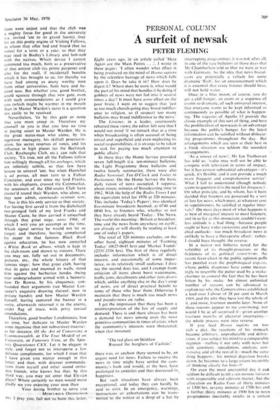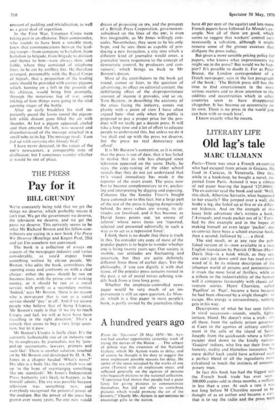PERSONAL COLUMN
A surfeit of newsak
PETER FLEMING
Eight years ago, in an article called 'Here
Again are the Main Points . . I wrote in these pages: 'I often wonder what effect is being produced on the mind of Homo sapiens
by the relentless barrage of news which falls upon it. Does he take it in? How does he digest it? Where does he store it, what would the part of his mind that handles it be doing if
gobbets of news were not fed into it several times a day? It must have some effect on the
poor brute. I went on to suggest that lust as too much church-going may breed indiffer- ence to religion, so (1 suspect) too many bulletins may breed indifference to the news.'
The Listener. in a leader, courteously rebutted these views; the editor felt sure that I
would not mind 'if we remark that at a time when broadcasting is often accused of being trivial and superficial and even neglecting its social responsibilities, it is strange to be taken to task for paying too much attention to public affairs'.
In those days the Home Service provided seven full-length (i.e. ten-minute) bulletins, the Light Programme three bulletins and
twelve hourly summaries; there were also Radio Newsreel, Ten O'Clock and Today in Parliament. On the Home Service the basic
daily ration of news occupied, I suppose, about ninety minutes of broadcasting time in
1962. With the help of the Radio Times I put
the equivalent total for 1970 at 320 minutes. This includes `Today's Papers', two identical five-minute broadcasts beamed, at 0740 and 0840 hrs, to listeners who, whether or not they have already heard 'Today: The News.
The world this morning : Britain at breakfast- time and the news from anywhere on earth'. are already or will shortly be reading at least one of today's papers.
The total of 320 minutes excludes, on the other hand, eighteen minutes of 'Farming Today' (0627-0645 hrs) and 'Market Trends' (2331-2336 hrs). The first of these regularly includes information which is of direct interest, and occasionally of some impor- tance. to its relatively small audience; I dare say the second does too, and I exempt from
criticism all items about burst watermains, traffic jams, derailments and other faits divers
which, unlike anything else in the day's crop of news, are of direct practical benefit to some of those who hear them. Otherwise I maintain that there is much too much news and pseudo-news on radio.
I get the impression that there has been a misinterpretation of the law of supply and demand. There is and there always has been a demand for news among even the most primitive communities in times of crisis, when the community's interests were threatened, when (for instance) `The red glare on Skiddaw Roused the burghers of Carlisle,' there was, or anyhow there seemed to be, an urgent need for news. Failure to receive the news in time might have settled the com- munity's hash and would, at the best, have prolonged its anxieties and thus decreased its_ happiness.
But such situations have always been exceptional. and today they can hardly be said to exist. In an emergency, warnings, instructions or exhortations can be trans- mitted to the nation at a drop of a hat by interrupting programmes; it was not, after all, in one of the rare bulletins of those days that Mr Chamberlain told us that we were at war with Germany. So the idea that news broad- casts are potentially a vehicle for some dramatic 'flash'. for an announcement which it is essential that every listener should hear, will not hold water.
Once in a blue moon, of course, you do get a cliff-hanger, an event or a sequence of events so dramatic, of such universal interest, that everyone wants to be kept informed as continuously as possible of what is happen- ing. The vagaries of Apollo 13 provide the classic example of this sort of thing, and here the proliferition of newscasts is an advantage because the public's hunger for the latest information can be satisfied without dislocat- ing programmes throughout the day. But arrangements which are seen at their best in a . freak situation are seldom the soundest arrangements.
`As a source of news', Mr Ian Trethowan has told us. 'radio may well not be able to compete with television in terms of impact, but it has certain substantial advantages—it's quick. it's flexible, and it can provide a much more frequent and comprehensive service'. What I fail to understand (though nobody seems to question it) is the need for frequency. On what principle. and by whom, has it been decided that listeners are possessed by a sort of lust for news, which must, at whatever cost in repetitiveness, be satisfied at regular inter- vals? On most days most of what happens is at best of marginal interest to most listeners; and in so far as this insouciant, couldn't-care- less attitude is a bad thing—bicause people ought to have wider curiosities and less paro- chial outlooks—too much broadcast news is unlikely to have a therapeutic effect : rather, should have thought, the reverse.
In a nation not hitherto noted for the volatility of its thought-processes or the fickleness of its political convirtinns. the recent fever-chart in the public opinion polls has puzzled even the psephological exp.rts, whose public diagnoses have come increas- ingly to rekemble the patter used by a snake- charmer to conceal the fact that he has been bitten by his snake. An almost unlimited number of reasons can be advanced to explain (a) why the Conservatives established a lead over Labour of 28 per cent in March 1969, and (b) why they have lost the whole of it, and more, fourteen months later. None of these reasons appear to me convincing; nor would I be at all surprised if—given another fourteen months of electoral uncertainty— the whole process went into reverse.
If you feed Homo sapiens on too rich a diet, the reactions of his stomach become arbitrary, unpredictable and delete- rious; if you subject his mind to a comparable regimen---stuffing it not only with news but with comment, speculation, analysis, con- troversy and all the rest of it—much the same thing happens : his mental digestion breaks down, he becomes to a large extent incapable of thinking clearly for himself On even the most uneventful day it can seldom be difficult to fill a ten-minute bulletin
with respectable and relevant matter; but the allocation on Radio Four of thirty minutes at 1300 hrs. seventy minutes at 1700 hrs and
a further thirty minutes at 1900 hrs to news programmes inevitably results in a certain
amount of padding and trivialisation, as well as a great deal of repetition.
In the First War, Umpteen Corps were taking part in an offensive. Their commander, who sounds to have been a sensible man, knew that communications betwen the lead- ing troops—from company to battalion, from battalion to brigade, from brigade to division and thence to him—were always slow, and liable, where they consisted of telephone lines, to be cut by artillery fire. He therefore arranged, presumably with the Roy al Corps of Signals, that a proportion of the leading units should be provided with carrier pigeons which, homing on a loft in the grounds of his chateau, would bring him promptly, through the notorious fog of war, some inkling of how things were going in the vital opening stages of the battle.
After an early breakfast his staff im- patiently paced the lawns round the pigeon- loft while distant guns filled the air with thunder. At last a pigeon appeared, circled and then entered the loft, was secured and disembarrassed of the message attached in a small tube to its leg. The message read : 'I am fed up with carrying this bloody bird.'
I have never detected, in the voices of the BBC's newscasters, a comparable note of disillusion; but I sometimes wonder whether it would be out of place.



































 Previous page
Previous page